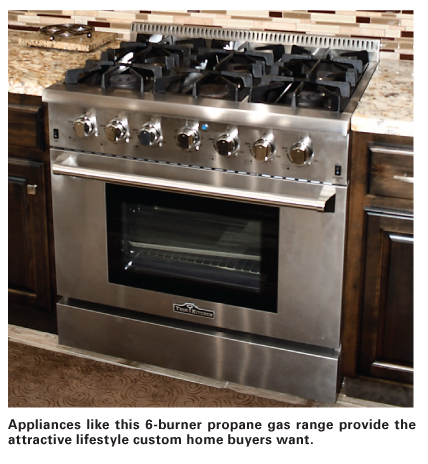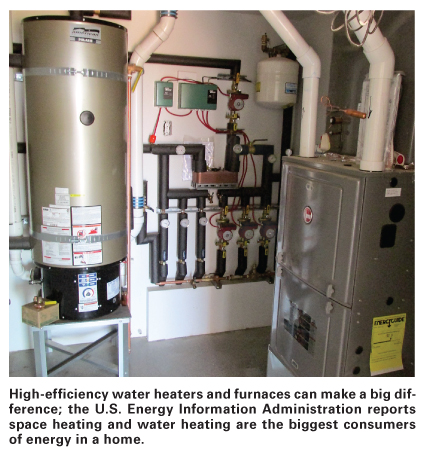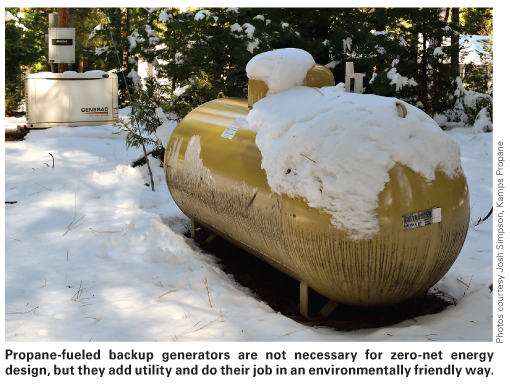Sunday, December 16, 2018
As a growing number of new homes are built with energy efficiency in mind, the propane industry is working to earn a place for propane appliances in those homes. They are doing so by showing architects, builders, and others how these appliances can save energy while also adding comfort. 
At the cutting edge of the move to greater energy efficiency are homes built to be zero-net energy (ZNE) or zero-energy ready (ZER). A ZNE home produces as much energy as it consumes. It is built with a high degree of energy efficiency and is equipped with a renewable energy source, such a photovoltaic array. A ZER home can supply 90% or more of the annual energy demand, or could if it were equipped with a renewable energy source.
The number of such buildings in the United States and Canada increased 49% in 2017, from 4077 buildings in 2016 to 6059 in 2017, according to the Net-Zero Energy Coalition (NZEC). The number of housing units increased 70%, from 8203 to 13,906. Among the housing units counted in 2017, 8323 were multi-family units and 5583 were single-family units.
California is the state in which the largest number of these units are to be found; in 2017, there were 5279 units in the state, NZEC reports. The state has set a goal of having all new residential construction zero net energy by 2020.
Kamps Propane (Manteca, Calif.), a propane marketer with 13 offices in California, hasn’t seen a big move to ZNE in the areas it serves, but the company has seen a greater interest in energy efficiency.
“We see consumers are changing and regulations are shaping the marketplace,” said Josh Simpson, vice president of marketing at Kamps Propane. “The builders we deal with have been adopting higher standards for conservation for the last five years, like others have been doing nationally. They are doing it not to achieve the ZNE goal, but to improve the efficiency of the home itself and make sure it does not consume energy in ways that are wasteful.”
The Western Propane Gas Association (WPGA), which represents propane marketers throughout California, and its members are also promoting the benefits of propane appliances to builders. They explain how these appliances can contribute to the energy efficiency of new and remodeled homes.
“Our marketers and association are sharing the role propane has through space heating and water heaters in helping builders meet efficiency requirements and provide components for ZNE,” said Joy Alafia, president and CEO of WPGA.
“We provide reliable data to agencies such as the California Energy Commission regarding historical pricing so they can derive better forecasts for propane’s cost when compared to other fuels,” she added. “We are also stepping up our presence, meeting with legislators to share the importance of providing reliable energy to rural and low-income consumers.”
The Propane Education & Research Council (PERC), too, has made this a priority: “We are making a big push focusing on zero-net energy and zero-energy ready, and how propane provides a viable solution,” said Jesse Marcus, director, residential and commercial business development at PERC. “That is certainly a topic we cover now and that we will focus on in strategic and tactical ways in 2019.”
Key Appliances
Two key propane appliances that can help builders improve a home’s energy efficiency are hybrid heating systems, which combine a heat pump with a propane furnace, and tankless water heaters. Marcus, Alafia, and Simpson spotlighted these appliances as solutions that are both efficient and economical. These solutions also address the top two energy-consuming uses in U.S. homes; the U.S. Energy Information Administration reports that space heating accounts for 43% of residential end-use energy consumption and water heating accounts for 19%.
“Tankless water heaters are a great fit along with space heaters due to their high energy efficiencies,” said Alafia.
“Heating systems used in the past won’t be used in the future,” commented Simpson. “We will see more of those hybrid home heating systems with propane backup, because of propane’s efficiency for heating and because it is more efficient than electricity. Tankless water heaters, too, are always an easy choice when meeting a ZNE goal. Those will be two keys to the efficiency of the home.”
Kamps Propane also finds that the builders it serves are interested in propane kitchen appliances and backup generators. These products aren’t necessary for ZNE design, he notes, but one adds comfort and the other adds utility — and both do what they do in an environmentally friendly way.
“There are aspects of propane at home that provide the attractive lifestyle custom home buyers want: restaurant-grade kitchens and remote-controlled fireplaces that offer convenience, ambiance, and heat on demand,” said Simpson. “We’re all familiar with the qualities of propane when it comes to heating a house—propane as a heat source provides heat that is warm. So, builders of high-end homes can provide buyers what they want in the ambiance of the home.”
“Many buildings in the areas we serve may not have an exceptionally reliable grid, so more builders are interested in propane-powered backup generators,” he added.
Getting the Word Out
Earlier this year, PERC launched a free online course for architects and builders called, “Introduction to Zero Net Energy Homes and Opportunities to Leverage High-Efficiency Propane Systems.” The course will count toward continuing education credits from the American Institute of Architects, the National Association of the Remodeling Industry, and the U.S. Green Building Council.
“We encourage marketers to make contacts with builders on a local and regional basis, share links to our resources, invite them to webinars, and subscribe to our Propane Energy Update newsletter,” Marcus said. “We are always available for discussion about resources and assets marketers would like to see; call us direct and see how we can help.”
Both Alafia and Simpson said they make extensive use of PERC resources, distributing them to builders and others who can use propane and propane appliances.
“Our association has promoted the new ZNE course via the Propane Training Academy,” Alafia said. “The program provides continuing education credits to builders and allows marketers to inform builders of the ways to integrate propane within their building fuel needs.”
Simpson said, “We constantly use the material being created by PERC and the opportunities created by them. They do a terrific job with that. It would be much harder for us to do what we do if PERC wasn’t doing what they do. Many of the resources we offer on our website are PERC materials.”
“In our office, we have a person who is essentially an account manager who reaches out to builders, helps them with permits, and provides the service they need when they need it during a project,” he continued. “We are one of many propane companies in California that have people dedicated to that market.”
“We have a great story to tell,” Simpson added. “The efficiency of propane as a fuel for homeowners and a resource for builders will create opportunities for us to help builders and to help homeowners when they move into the areas we serve. We just have to focus on doing what we do.
“The technology and marketplace are evolving,” he said, when asked about the impact ZNE may have on California propane marketers. “We expect to compete for the residential and commercial opportunities with new appliances that keep propane in the American energy mix for the 21st century and beyond.”
Marcus said, “There is a perception that electrification is the only answer. We have to defeat that message. ZNE and ZER does not always mean electric; there is room for propane and we already have high-efficiency appliances. This has been proven in multiple case studies. We are not trying to force a square peg in a round hole; it does work.”
For more information about the free online course and other resources for builders, visit www.buildwithpropane.com. Kamps Propane and the services it offers California builders and other customers can be seen at www.kampspropane.com. Information about WPGA, the association representing California marketers, is found at www. westernpga.org. —Steve Relyea

At the cutting edge of the move to greater energy efficiency are homes built to be zero-net energy (ZNE) or zero-energy ready (ZER). A ZNE home produces as much energy as it consumes. It is built with a high degree of energy efficiency and is equipped with a renewable energy source, such a photovoltaic array. A ZER home can supply 90% or more of the annual energy demand, or could if it were equipped with a renewable energy source.
The number of such buildings in the United States and Canada increased 49% in 2017, from 4077 buildings in 2016 to 6059 in 2017, according to the Net-Zero Energy Coalition (NZEC). The number of housing units increased 70%, from 8203 to 13,906. Among the housing units counted in 2017, 8323 were multi-family units and 5583 were single-family units.
California is the state in which the largest number of these units are to be found; in 2017, there were 5279 units in the state, NZEC reports. The state has set a goal of having all new residential construction zero net energy by 2020.
Kamps Propane (Manteca, Calif.), a propane marketer with 13 offices in California, hasn’t seen a big move to ZNE in the areas it serves, but the company has seen a greater interest in energy efficiency.
“We see consumers are changing and regulations are shaping the marketplace,” said Josh Simpson, vice president of marketing at Kamps Propane. “The builders we deal with have been adopting higher standards for conservation for the last five years, like others have been doing nationally. They are doing it not to achieve the ZNE goal, but to improve the efficiency of the home itself and make sure it does not consume energy in ways that are wasteful.”

The Western Propane Gas Association (WPGA), which represents propane marketers throughout California, and its members are also promoting the benefits of propane appliances to builders. They explain how these appliances can contribute to the energy efficiency of new and remodeled homes.
“Our marketers and association are sharing the role propane has through space heating and water heaters in helping builders meet efficiency requirements and provide components for ZNE,” said Joy Alafia, president and CEO of WPGA.
“We provide reliable data to agencies such as the California Energy Commission regarding historical pricing so they can derive better forecasts for propane’s cost when compared to other fuels,” she added. “We are also stepping up our presence, meeting with legislators to share the importance of providing reliable energy to rural and low-income consumers.”
The Propane Education & Research Council (PERC), too, has made this a priority: “We are making a big push focusing on zero-net energy and zero-energy ready, and how propane provides a viable solution,” said Jesse Marcus, director, residential and commercial business development at PERC. “That is certainly a topic we cover now and that we will focus on in strategic and tactical ways in 2019.”
Key Appliances
Two key propane appliances that can help builders improve a home’s energy efficiency are hybrid heating systems, which combine a heat pump with a propane furnace, and tankless water heaters. Marcus, Alafia, and Simpson spotlighted these appliances as solutions that are both efficient and economical. These solutions also address the top two energy-consuming uses in U.S. homes; the U.S. Energy Information Administration reports that space heating accounts for 43% of residential end-use energy consumption and water heating accounts for 19%.
“Tankless water heaters are a great fit along with space heaters due to their high energy efficiencies,” said Alafia.
“Heating systems used in the past won’t be used in the future,” commented Simpson. “We will see more of those hybrid home heating systems with propane backup, because of propane’s efficiency for heating and because it is more efficient than electricity. Tankless water heaters, too, are always an easy choice when meeting a ZNE goal. Those will be two keys to the efficiency of the home.”

Kamps Propane also finds that the builders it serves are interested in propane kitchen appliances and backup generators. These products aren’t necessary for ZNE design, he notes, but one adds comfort and the other adds utility — and both do what they do in an environmentally friendly way.
“There are aspects of propane at home that provide the attractive lifestyle custom home buyers want: restaurant-grade kitchens and remote-controlled fireplaces that offer convenience, ambiance, and heat on demand,” said Simpson. “We’re all familiar with the qualities of propane when it comes to heating a house—propane as a heat source provides heat that is warm. So, builders of high-end homes can provide buyers what they want in the ambiance of the home.”
“Many buildings in the areas we serve may not have an exceptionally reliable grid, so more builders are interested in propane-powered backup generators,” he added.
Getting the Word Out
Earlier this year, PERC launched a free online course for architects and builders called, “Introduction to Zero Net Energy Homes and Opportunities to Leverage High-Efficiency Propane Systems.” The course will count toward continuing education credits from the American Institute of Architects, the National Association of the Remodeling Industry, and the U.S. Green Building Council.
“We encourage marketers to make contacts with builders on a local and regional basis, share links to our resources, invite them to webinars, and subscribe to our Propane Energy Update newsletter,” Marcus said. “We are always available for discussion about resources and assets marketers would like to see; call us direct and see how we can help.”
Both Alafia and Simpson said they make extensive use of PERC resources, distributing them to builders and others who can use propane and propane appliances.
“Our association has promoted the new ZNE course via the Propane Training Academy,” Alafia said. “The program provides continuing education credits to builders and allows marketers to inform builders of the ways to integrate propane within their building fuel needs.”
Simpson said, “We constantly use the material being created by PERC and the opportunities created by them. They do a terrific job with that. It would be much harder for us to do what we do if PERC wasn’t doing what they do. Many of the resources we offer on our website are PERC materials.”
“In our office, we have a person who is essentially an account manager who reaches out to builders, helps them with permits, and provides the service they need when they need it during a project,” he continued. “We are one of many propane companies in California that have people dedicated to that market.”
“We have a great story to tell,” Simpson added. “The efficiency of propane as a fuel for homeowners and a resource for builders will create opportunities for us to help builders and to help homeowners when they move into the areas we serve. We just have to focus on doing what we do.
“The technology and marketplace are evolving,” he said, when asked about the impact ZNE may have on California propane marketers. “We expect to compete for the residential and commercial opportunities with new appliances that keep propane in the American energy mix for the 21st century and beyond.”
Marcus said, “There is a perception that electrification is the only answer. We have to defeat that message. ZNE and ZER does not always mean electric; there is room for propane and we already have high-efficiency appliances. This has been proven in multiple case studies. We are not trying to force a square peg in a round hole; it does work.”
For more information about the free online course and other resources for builders, visit www.buildwithpropane.com. Kamps Propane and the services it offers California builders and other customers can be seen at www.kampspropane.com. Information about WPGA, the association representing California marketers, is found at www. westernpga.org. —Steve Relyea

